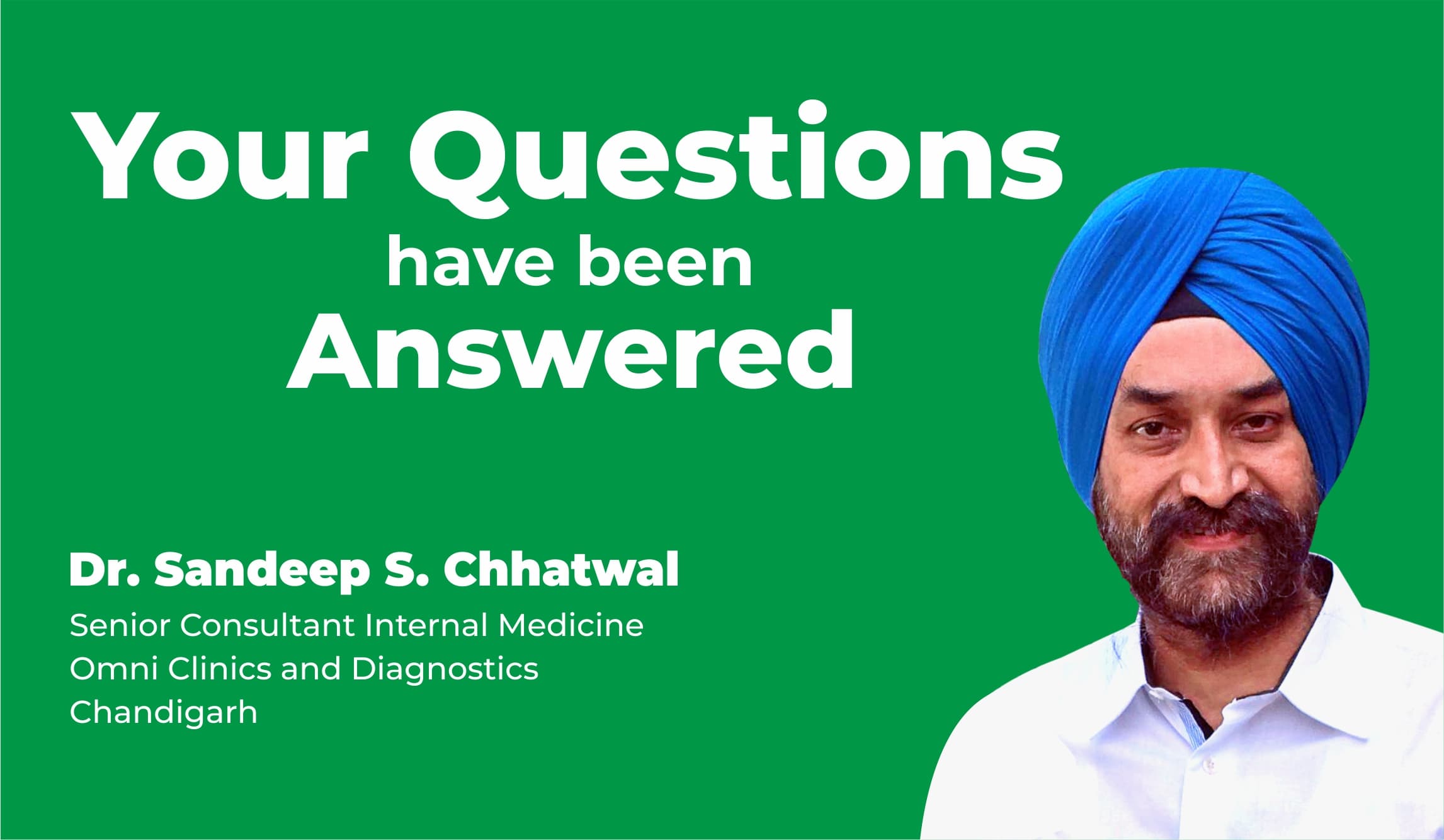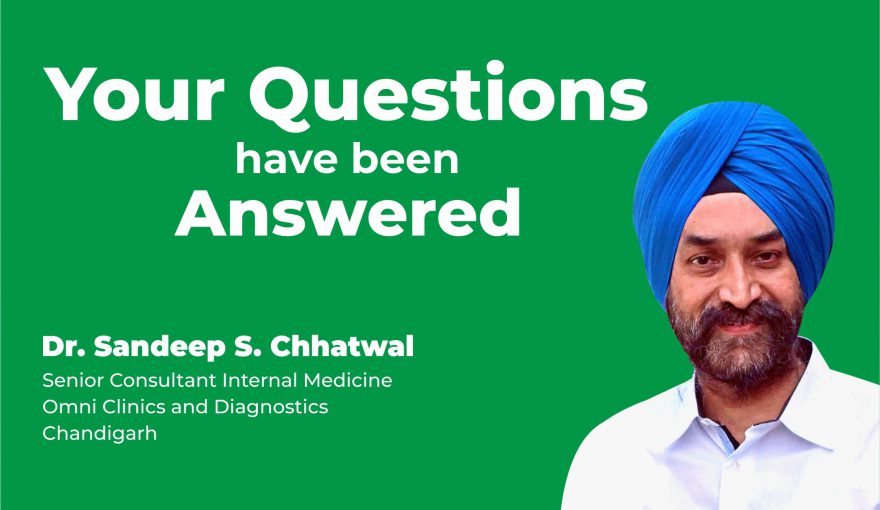Your Questions Answered By Our Experts

Question: I am facing gluten intolerance from last 4 years and I am taking gluten free diet. But now I start having bloated stomach. What’s the reason for that?
Answer: Bloating of the stomach can have many reasons other than gluten intolerance. Lactose intolerance may be a common associated condition. You could get yourself tested for that. One may be sensitive to some legumes or vegetables. You could maintain a food diary and check what all foods cause intolerance.
Question: Difference among wheat allergy, gluten intolerance and celiac disease ?
Answer: Wheat allergy usually presents with skin and bronchial symptoms like asthma when one is exposed to wheat. This is mediated by an antibody called IgE. Patients respond to removing wheat from diet or environment and are treated with antiallergics just as other allergies. The allergy is usually limiting meaning it gets over in a short period of time.
Gluten intolerance is a condition in which the intestine reacts to challenge by gluten i.e exposure to food products containing gluten in the form of bloating, pain or diarrhea. If there is no exposure there are no symptoms. Gluten, however, does not damage the intestine. Gluten intolerant people don’t have the gene or the antibody which is present in celiacs.
Celiac disease is an autoimmune disease in which the intestine gets damaged because of exposure to gluten in genetically predisposed people and can lead to a lot of serious consequences caused because of inflammation and malabsorption. Being an autoimmune disease, it can be associated with other autoimmune diseases the most common being hypothyroidism.
Question: Hello sir I am gluten sensitive since 2020. I get sick of gas. What I do for that?”
Answer: That’s easy…avoid gluten.
Question: Can a person with celiac disease face issues with menstruation/menstrual cycle?
Answer: Coeliac disease can have an impact on the menstrual cycle in many ways. Firstly, a young girl who is coeliac may have a delay in onset of periods (menarche). Secondly, periods may be irregular with variable flow and patients may have a higher incidence of dysmenorrhoea (painful periods). Lastly, celiacs remain fertile for shorter duration as they may have early menopause.
Question: “My son (age 15 years) is having celiac (last 7 years) at starting stage while eating gluten by mistake his body reacts with severe headache or stomach ache but now reactions is stopped….so can I think celiac diseases is cured? Just to know the level of celiac which test has to be done? Every year we have to test celiac?”
Answer: Not having reactions does not mean celiac disease is cured. Once a celiac…. always a celiac. One should regularly test for antibodies ( ttG IgA ) to check for exposure to gluten. Keep in mind that a negative test does not mean exposure is not happening or that your child has started tolerating gluten. Celiac disease is an autoimmune disease and can affect the body in more than one way.
Question: My daughter is celiac and facing problem of constipation. She is taking medicine on daily basis for the last 4 years.
Answer: Constipation can be a symptom of coeliac disease. This happens when the gut in coeliacs absorbs more moisture than it should.
What you should also know is that gluten free diet has less fiber. Build your child’s diet around fresh fruits, vegetables, salads and nuts Include gluten-free whole grains like quinoa, buckwheat, amaranth, millet and brown rice. Ensure that your child is drinking enough liquids. Increasing fiber intake without increasing fluid intake can actually make the situation worse.
Exercise should be a regular part of the daily routine.
Hypothyroidism is a common disease which causes constipation and is seen in coeliacs. Get your child’s thyroid profile done.
If your child continues to experience constipation then one needs to rule out other conditions that can occur along side celiac disease and trigger constipation. For this you need to talk to your treating doctor.
Question: Why doesn’t the gluten come zero on testing when there is no gluten like in Kissan ketchup and Bikano. To be more precise, Do the products of Wheafree or homemade completely gluten free products which are completely devoid of gluten also show such readings on testing like 2, 3, 1.5….ppm its confusing.
Answer: For testing one should use the accurate weight of the test sample as mentioned on the kit. Using a higher or lower quantity may give a false positive or negative result. It also depends on the method one uses for testing whether it is Lateral flow devices( LFD’s) vs ELISA which are beyond scope of this discussion.
As a thumb rule remember that if the test done accurately shows gluten <20 ppm, the product is safe for consumption.
Question: Hello sir I have been celiac since 2011 and it’s been 11 years and I have been taking gluten free diet. Recently, I have undergone ultrasound which shows that my gallbladder wall is thickening around 10.3 mm and a little bit of fatty liver. Please suggest what I can do to get this resolved.
Answer: Liver enzymes may increase in coeliac disease. There may be other diseases associated with coeliac disease. To start with get an LFT, GGT and ttGIgA tested. Get a Fibroscan liver done if it is available in your city. This would help get a more clear picture.
Follow up gall bladder thickening with a serial ultrasound every 6 months.
Question: My son 18 diagnosed celiac 10 yrs back. His ttg remains around 15-16.He is too skinny with lean bones .
How to increase his muscle mass and make bones stronger .(we are vegetarians)We strictly follow GF diet.
Answer: What is the cut off level of ttG for your lab? If ttG is higher than upper limit of normal think on lines of contamination or hidden gluten in his diet. Get him screened for iron and vitamin deficiencies. Get his sugar and thyroid profile tested . You should also see your doctor to rule out any other illness which may be associated with coeliac disease.
If all above is okay, see a qualified dietician to plan his diet.
Question: Hello sir I am gluten sensitive since 2020 . I get sick of gas. What I do for that.
Answer: That’s easy…avoid gluten
We have got experts to help you with your doubts and queries related to celiac/gluten intolerance. It’s time to have your questions answered!
Our Expert:

Dr Sandeep S Chhatwal
Senior Consultant Internal Medicine
Omni Clinics and Diagnostics
SCO 343-345 / 34 A
Chandigarh
Dr Sandeep S Chhatwal is a Senior Consultant Internal Medicine and Managing Director of Omni Clinics and Diagnostics. With over 25 years of experience, he has special interest in Allergies, Diabetes, Geriatrics and Adolescent health disorders. He is a member of various Medical forums and is actively engaged in community workshops, training and awareness programmes. Dr Chhatwal is the founder and Managing Trustee of NGO Veeranwali foundation. The NGO touches more than 3000 underprivileged children a month in fields of education and healthcare through its flagship project Nanhi Jaan.
Dr Chhatwal is also a Coeliac and that helps him relate better with his coeliacs under his care.

Question: My son(17yrs) being on gluten free diet since past 8 yrs… TTG levels controlled, hemoglobin levels maintained…still he’s too lean and skinny what can be done? (Vegetarian)
Answer: Lean and skinny may be normal till he is asymptomatic with good energy levels, good appetite with controlled ttg/normal Hb. Usually at this age basal metabolic rate is high weight gain may not occur. It’s important to calculate his calories intake and type of ingredients in his diet.
Question: Sir, I was diagnosed with celiac about three years ago, due to symptoms of diarrhea and since then I am on gluten-free diet and my TTG level comes below 22 from 159, but still today I am facing morning diarrhea one or two times, and my weight also does not increase, but blood level is increased, why?
Answer: One needs to check stool consistency also along with frequency. If stools are normal but more frequent you need to still check for inadvertent exposure to gluten, check for TTG levels. If a strict gluten free diet is being followed and TTG is falling or normal, an increase frequency of stool could be due to many other associated conditions like – IBS, microscopic colitis, pancreatic exocrine deficiency, secondary bacterial overgrowth
Question: How can we get ingredients list of medicine and supplements (vitamins etc) to know if they are gluten and soy and corn free?
Answer: According to the FDA, “The vast majority of oral drug products either contain no gluten or virtually no gluten. In the very rare cases where gluten may be present, we estimate based on drug formulation information that wheat starch and other ingredients derived from wheat would contribute no more than 0.5 mg gluten to a unit dose of an oral drug product. This amount is less than may be found in a single 30-gram serving of food labeled gluten-free according to FDA’s regulations.”
Gluten can be used in many medications as an excipient, so it is important for you to check that each medication you take is gluten-free. If you have Celiac disease and are filling a prescription, ask the pharmacist to verify the ingredients to ensure that it is gluten-free. You can ask their help in reading and understanding the list of ingredients or contact the manufacturer.
Some Excipients to look for:
Dextrins – Result from the hydrolysis of starch by heat or hydrochloric acid (from corn). It can also be obtained from wheat, rice or tapioca.
Dextrates (when source is not specified)
Dextri-maltose (when barley malt is used)
Maltodextrin – A startch hydolysate that is usually obtained from corn but can be extracted from wheat, potato or rice
Modified Starch (when source is not specified)
Pregelantinized Starch – a starch that has been chemically or mechanically processed. The starch can come from corn, wheat, potato or tapioca
Sodium Starch Glycolate – a starch that is usually obtained from potato but many come from any starch source
Answers can be found on the package insert and the key word to look for is starch. If the starch is listed as “cornstarch” or starch (corn) it can be assumed to be gluten-free. However, if starch is listed by itself the only way to confirm the source is to call the manufacturer
Question: Does Multifold TTG result in the range of 160 is enough for diagnosis of Celiac Disease as it reduces to 30 on Gluten Free Diet after 18 months?
Answer : Not enough for diagnosis. Gold standard of diagnosis is duodenal biopsy showing changes of villous atrophy. In children if TTG is more than 10 times the upper limit then you may avoid biopsy by performing other tests like antiendomysial antibodies plus HLA DQ 2/8
Question: I was diagnosed with celiac about three years ago, due to symptoms of diarrhoea and since then I am on gluten free diet and my TTG level comes down to 22 from 159, but still today I am facing morning diarrhoea one or two times, and my weight is not increasing, but blood level has increased, Why?
Answer: There are many other causes of diarrhoea persisting despite being on gluten free diet:
- Inadvertent intake of gluten which you are not aware
- Micros scopic colitis
- Secondary bacterial overgrowth
- Pancreatic exocrine dysfunction
Question: My daughter aged 17 years has been diagnosed with celiac disease in July 2021. Is there any medicine which can be given to her if she is accidentally glutened?
Answer: There is no specific treatment but only symptomatic treatment can be given.
Question: How many chances of celiac in new born baby if you are celiac?
Answer: First-degree relatives (parent, sibling, child) of someone with celiac disease have a 1 in 10 chance of developing celiac disease.
Question: If on testing any food product, gluten is 1.5 ppm as in Kissan ketchup testing, is it still preferable to avoid it as it is not 0 ppm( although less than 20 ppm) or can be taken without giving it any thought.?


Kamaljeet kaur
Thanku Sir. Very informative .Thanku wheafree for this initiative.
Wishing wheafree great success and prosperity.